There’s an anecdote from a book called Start-Up Nation that has always stayed with David Maher.
Chronicling the recent history of the tech scene in Israel, the story goes that officials held a meeting to decide what would be the best thing to build in Tel Aviv to encourage entrepreneurship: a new airport or a motorway.
But?
“At the end of the meeting, they said, ‘We’re going to build an opera house in Tel Aviv,’” says David, explaining that their rationale was if people were expected to work hard, they would need something to do at the weekend.
“What they want is culture,” he continues, “so you have to do something culturally significant if you want to bring on the place.”
And while Portarlington, Co Laois might not seem to have that much in common with Tel Aviv, the idea of doing something culturally significant was very much behind Maher’s latest venture, Solas Eco Garden Centre, opened in 2021 on what was an abandoned steelworks site, with almost €3 million invested to date with attractions including a food court,? Ireland’s largest mural and even a 40 foot light tower.
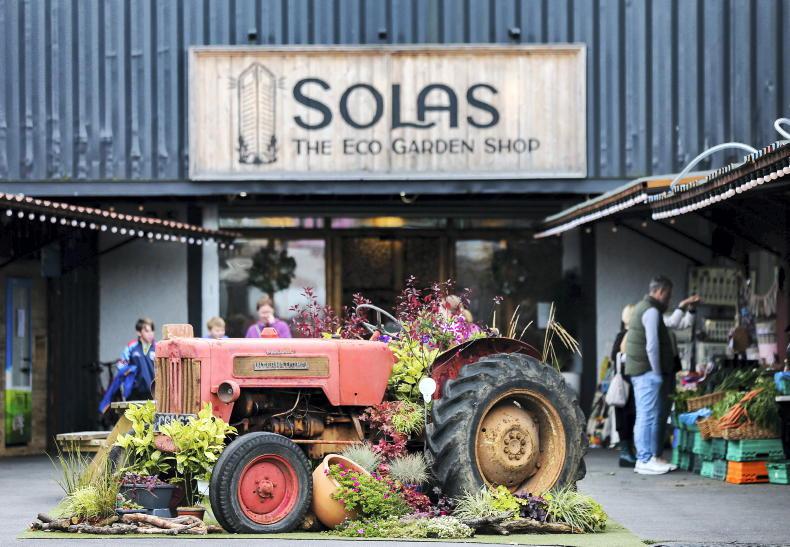
A vintage tractor makes for an interesting art installation at Solas \ Lorraine O Sullivan
“I always described it as building my own supermodel!” jokes David, a serial entrepreneur and a straight shooter, who arrives for our interview by bicycle, with his faithful German shepherd in tow.
Serial entrepreneur
And while it might be hard to imagine looking at it today, the site where Solas is based was once farmed by David’s family, but sold in the 1960s to an entrepreneur called Paddy Butler, who was looking to buy nine acres to expand his engineering business.
“My father explained we never sell land, ever,” explains David. “So what Paddy Butler did was he said, ‘OK’. He waited until a parcel of land came up that had no road frontage- about 30 acres- and then he came back to my father and asked would my father swap our nine acres for the 30 acres, which of course he did.”
While Butler’s Engineering would go on to become one of the biggest employers in town, winning major contracts including Middlesborough Stadium in the UK, sadly the Maher family’s fortunes received a cruel blow when David’s father died when he was just five.
“My mother was left with seven children between five and 14,” says David, who explains that while they would have been seen as “affluent” with a 300-acre beef and tillage farm, the reality was otherwise.

The garden centre at Solas accounts for 30% of turnover \ Lorraine O Sullivan
“We were certainly asset-rich, but in terms of cash, there was no cash,” says David.
It didn’t hold him back. After studying engineering, David started work as a software engineer, but quickly figured that corporate life was not for him. Quitting his job in 2002, he was working with a stone mason when he saw an article that the BBC was going to start broadcasting its signal for free on satellite.
An idea hatched
“I went up to Dublin, I bought one of these systems, after two days of labouring quite hard, I managed to get it to work and then I bought 10 more systems and put an ad in advertising myself as an expert satellite installer,” laughs David, who adds that Midlands TV soon “turned into a huge business”.
“Quite early on in that business, we would have been making €1,500-€2,000 profit a week.”
David soon identified another gap in the building boom for a grass cutting contracts business.
“We ended up getting 15-20 housing estates, so that grew to a business that was worth about €50k a year,” he says.
When the economic crash hit, David pivoted again to set up Free TV, selling products like free-to-air boxes, aerials and satellites to TV stores in Ireland. Later on, he got involved in property, but the seed for Solas was set when he and his business partner, horticulturist John Carey, bought the domain name TheGardenShop.ie in 2013 and started developing the online garden centre business.
As that business thrived, David’s thoughts turned to the Butlers’ site that his father had sold in the ‘60s. Butlers had gone into receivership in the ‘90s and despite a subsequent takeover by SIAC, the business closed, with the site lying derelict for a decade.
“I bought this place in 2017,” says David, who says that many people advised him to build a petrol station on the site. But?
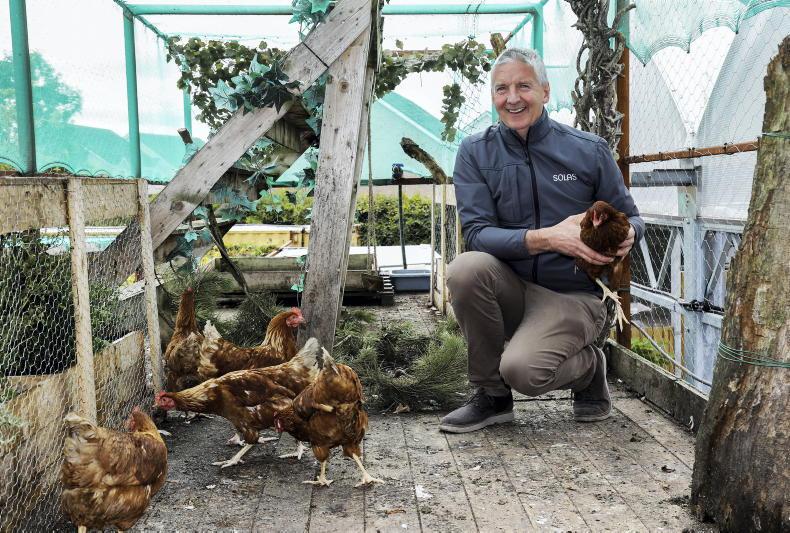
David with the resident Solas chickens \ Lorraine O Sullivan
“I said to John, ‘I think we should build something crazy in Portarlington that’s not going to be anywhere else in the country because that’s our best chance’. Big and bold and photogenic.”
The inspiration for Solas came from a trip to Pllek in Amsterdam; a restaurant built out of repurposed shipping containers. After hiring the same architect, David sourced 40 40-foot containers at a cost of €2,400 each, with work commencing in early 2021.
“The guy who did all the welding here, he designs cattle trucks,” says David, who was keen to provide local employment on the project, which from site to finish has seen an investment of nearly €3 million funded by their own investment, borrowings, plus €200,000 of LEADER support.
It’s easy to see where it went; the retractable roof set him back €120,000, while €75,000 has been spent on murals, art and a giant light tower. But David believes that it was a case of go big or go home.
“To get the destination status straight away,” he argues, “we have to be big and we have to be different.”
Environmental-friendliness was also a consideration; for instance, they invested €150,000 in solar panels, which David says produces 80% of their power, use drip irrigation for the garden centre and give food waste to their on-site chickens that live on the garden centre roof.
(He says that his plan to put sheep on the roof initially was roundly vetoed). With soaring energy prices, they have also decided to move their restaurant indoors for the winter, with 80-100 seats inside a repurposed 40ft refrigeration container warmed by heat pump instead of gas.
“It’s just good business economics,” says David.
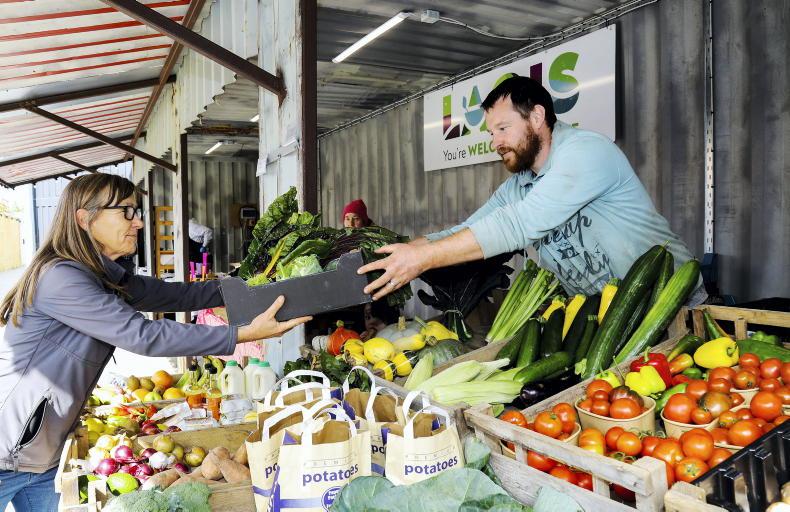
Cormac Loonam at his vegetable stall in the market at Solas. \ Lorraine O'Sullivan
There are three main elements to Solas: a garden centre selling plants and flowers accounting for 30% of turnover, a garden shop stocking 4,500 products accounting for 40% and ?food accounting for 30%.
In addition, Solas regularly holds special events, from book and clothes swaps and craft, gardening and ecology workshops to a French festival celebrating Portarlington’s Huguenot heritage; but the biggest attraction by far is the Saturday farmers’ market.
“Including VAT, your electricity, your stall, it’s €20 a week,” says David, while another farm-related venture has been the installation of a milk vending machine in partnership with local dairy farmers Micheál and Cora Finlay (see panel).
In its first year in business, David says that Solas turned over €1.4 million, but he knows that the business will need to grow to justify the expenditure to date.
“If we could just get a few less compliments and a little bit more cash,” he quips, acknowledging that Portarlington’s relative proximity to Dublin will be a major factor in its success.
Throughout the interview, David references entrepreneurs from Intel’s Andy Gove ?to Ryanair’s home-grown Michael O’Leary. It comes as no surprise when he tells us that his office walls are painted in white board paint, or that he often quotes Greek and Roman history in business meetings, “because everything else has been such a repeat since”.
That said, he is also self-deprecating.
“My wife says I’m the world’s most optimistic man; despite all the evidence to the contrary,” he jokes at one stage.
Asked what advice he would give to other rural entrepreneurs wanting to do something outside the box, he has this advice.
“Make sure that you prove yourself before you prove the idea,” he responds, “and make sure that you can do most of the heavy lifting yourself.
“And bring people on, not by the strength of your ideas, but by the strength of your achievements.”
To find
out more visit
www.ecogardenshop.ie
One of the most recent developments at Solas has been the installation of the “Moo Cow Fresh Milk” vending machine by local farming couple, Micheál and Cora Finlay.
The pair milk 90 cows on their third-generation dairy farm, which is located just 500 metres from Solas. Micheál father Liam is also involved on the farm, as is his uncle Michael, especially in terms of the recent development work there. While the Finlays currently supply Tirlán (Glanbia) and will continue to do so, they explain that it has been a long-held ambition to sell their own milk direct to the consumer.
“My dad has always wanted to supply milk,” says Micheál, explaining that with Solas opening on their doorstep, it was now or never.
“Solas has a huge role to play because the farmers’ market there has a huge footfall at present and it just made sense to set up now and get moving.”
Close to €150,000 has been invested in the venture. This has included building a 10 x 8 metre facility on the farm with a pasteuriser, ice bank, and cold room,? with a double vending machine with a total capacity of 400 litres of milk installed at Solas, along with a bottle machine. The couple expect to charge €1.60 per litre of milk, and be up and running from early October.
“We’re trying to keep it as much in line with the shops as possible, because we understand the circumstances everybody is going to have this year in terms of the electricity costs and all the rest,” says Micheál.
The arrangement with Solas is that they pay rent for the space for their machines. For them, it makes sense on many levels.
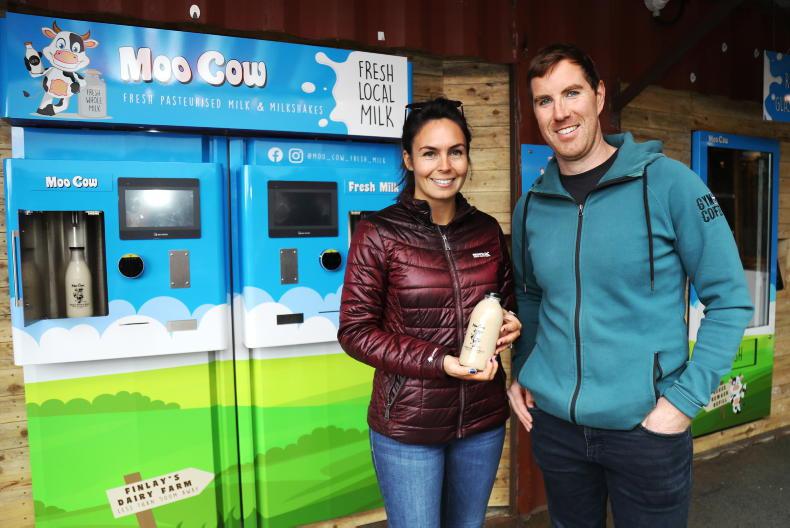
Micheál and Cora Finlay who have set up Moo Cow Fresh Milk, which will distribute fresh milk at Solas. \ Lorraine O'Sullivan
“A bit of safety as well,” cites Cora of another benefit of selling at Solas rather than the home farm. “There’s free parking and it’s on the Dublin road as well, so there’s a constant flow of footfall.”
Their hope is to be able to sell their milk year round at Solas, and eventually to bottle milk themselves to supply to local hotels and cafes.
“Because we’re starting now, we’re only spring calving, but we’re planning on milking the late calvers next year through the winter, and then we brought the calving season forward by two weeks for next year, so we’re going to be calving in the middle of January rather than the 1 February, so we’re hoping that will overlap. We mightn’t have the huge quantity, but we’re hoping we will have enough to keep it going,” explains Micheál.
Follow @moo_cow_fresh_milk
There’s an anecdote from a book called Start-Up Nation that has always stayed with David Maher.
Chronicling the recent history of the tech scene in Israel, the story goes that officials held a meeting to decide what would be the best thing to build in Tel Aviv to encourage entrepreneurship: a new airport or a motorway.
But?
“At the end of the meeting, they said, ‘We’re going to build an opera house in Tel Aviv,’” says David, explaining that their rationale was if people were expected to work hard, they would need something to do at the weekend.
“What they want is culture,” he continues, “so you have to do something culturally significant if you want to bring on the place.”
And while Portarlington, Co Laois might not seem to have that much in common with Tel Aviv, the idea of doing something culturally significant was very much behind Maher’s latest venture, Solas Eco Garden Centre, opened in 2021 on what was an abandoned steelworks site, with almost €3 million invested to date with attractions including a food court,? Ireland’s largest mural and even a 40 foot light tower.

A vintage tractor makes for an interesting art installation at Solas \ Lorraine O Sullivan
“I always described it as building my own supermodel!” jokes David, a serial entrepreneur and a straight shooter, who arrives for our interview by bicycle, with his faithful German shepherd in tow.
Serial entrepreneur
And while it might be hard to imagine looking at it today, the site where Solas is based was once farmed by David’s family, but sold in the 1960s to an entrepreneur called Paddy Butler, who was looking to buy nine acres to expand his engineering business.
“My father explained we never sell land, ever,” explains David. “So what Paddy Butler did was he said, ‘OK’. He waited until a parcel of land came up that had no road frontage- about 30 acres- and then he came back to my father and asked would my father swap our nine acres for the 30 acres, which of course he did.”
While Butler’s Engineering would go on to become one of the biggest employers in town, winning major contracts including Middlesborough Stadium in the UK, sadly the Maher family’s fortunes received a cruel blow when David’s father died when he was just five.
“My mother was left with seven children between five and 14,” says David, who explains that while they would have been seen as “affluent” with a 300-acre beef and tillage farm, the reality was otherwise.

The garden centre at Solas accounts for 30% of turnover \ Lorraine O Sullivan
“We were certainly asset-rich, but in terms of cash, there was no cash,” says David.
It didn’t hold him back. After studying engineering, David started work as a software engineer, but quickly figured that corporate life was not for him. Quitting his job in 2002, he was working with a stone mason when he saw an article that the BBC was going to start broadcasting its signal for free on satellite.
An idea hatched
“I went up to Dublin, I bought one of these systems, after two days of labouring quite hard, I managed to get it to work and then I bought 10 more systems and put an ad in advertising myself as an expert satellite installer,” laughs David, who adds that Midlands TV soon “turned into a huge business”.
“Quite early on in that business, we would have been making €1,500-€2,000 profit a week.”
David soon identified another gap in the building boom for a grass cutting contracts business.
“We ended up getting 15-20 housing estates, so that grew to a business that was worth about €50k a year,” he says.
When the economic crash hit, David pivoted again to set up Free TV, selling products like free-to-air boxes, aerials and satellites to TV stores in Ireland. Later on, he got involved in property, but the seed for Solas was set when he and his business partner, horticulturist John Carey, bought the domain name TheGardenShop.ie in 2013 and started developing the online garden centre business.
As that business thrived, David’s thoughts turned to the Butlers’ site that his father had sold in the ‘60s. Butlers had gone into receivership in the ‘90s and despite a subsequent takeover by SIAC, the business closed, with the site lying derelict for a decade.
“I bought this place in 2017,” says David, who says that many people advised him to build a petrol station on the site. But?

David with the resident Solas chickens \ Lorraine O Sullivan
“I said to John, ‘I think we should build something crazy in Portarlington that’s not going to be anywhere else in the country because that’s our best chance’. Big and bold and photogenic.”
The inspiration for Solas came from a trip to Pllek in Amsterdam; a restaurant built out of repurposed shipping containers. After hiring the same architect, David sourced 40 40-foot containers at a cost of €2,400 each, with work commencing in early 2021.
“The guy who did all the welding here, he designs cattle trucks,” says David, who was keen to provide local employment on the project, which from site to finish has seen an investment of nearly €3 million funded by their own investment, borrowings, plus €200,000 of LEADER support.
It’s easy to see where it went; the retractable roof set him back €120,000, while €75,000 has been spent on murals, art and a giant light tower. But David believes that it was a case of go big or go home.
“To get the destination status straight away,” he argues, “we have to be big and we have to be different.”
Environmental-friendliness was also a consideration; for instance, they invested €150,000 in solar panels, which David says produces 80% of their power, use drip irrigation for the garden centre and give food waste to their on-site chickens that live on the garden centre roof.
(He says that his plan to put sheep on the roof initially was roundly vetoed). With soaring energy prices, they have also decided to move their restaurant indoors for the winter, with 80-100 seats inside a repurposed 40ft refrigeration container warmed by heat pump instead of gas.
“It’s just good business economics,” says David.

Cormac Loonam at his vegetable stall in the market at Solas. \ Lorraine O'Sullivan
There are three main elements to Solas: a garden centre selling plants and flowers accounting for 30% of turnover, a garden shop stocking 4,500 products accounting for 40% and ?food accounting for 30%.
In addition, Solas regularly holds special events, from book and clothes swaps and craft, gardening and ecology workshops to a French festival celebrating Portarlington’s Huguenot heritage; but the biggest attraction by far is the Saturday farmers’ market.
“Including VAT, your electricity, your stall, it’s €20 a week,” says David, while another farm-related venture has been the installation of a milk vending machine in partnership with local dairy farmers Micheál and Cora Finlay (see panel).
In its first year in business, David says that Solas turned over €1.4 million, but he knows that the business will need to grow to justify the expenditure to date.
“If we could just get a few less compliments and a little bit more cash,” he quips, acknowledging that Portarlington’s relative proximity to Dublin will be a major factor in its success.
Throughout the interview, David references entrepreneurs from Intel’s Andy Gove ?to Ryanair’s home-grown Michael O’Leary. It comes as no surprise when he tells us that his office walls are painted in white board paint, or that he often quotes Greek and Roman history in business meetings, “because everything else has been such a repeat since”.
That said, he is also self-deprecating.
“My wife says I’m the world’s most optimistic man; despite all the evidence to the contrary,” he jokes at one stage.
Asked what advice he would give to other rural entrepreneurs wanting to do something outside the box, he has this advice.
“Make sure that you prove yourself before you prove the idea,” he responds, “and make sure that you can do most of the heavy lifting yourself.
“And bring people on, not by the strength of your ideas, but by the strength of your achievements.”
To find
out more visit
www.ecogardenshop.ie
One of the most recent developments at Solas has been the installation of the “Moo Cow Fresh Milk” vending machine by local farming couple, Micheál and Cora Finlay.
The pair milk 90 cows on their third-generation dairy farm, which is located just 500 metres from Solas. Micheál father Liam is also involved on the farm, as is his uncle Michael, especially in terms of the recent development work there. While the Finlays currently supply Tirlán (Glanbia) and will continue to do so, they explain that it has been a long-held ambition to sell their own milk direct to the consumer.
“My dad has always wanted to supply milk,” says Micheál, explaining that with Solas opening on their doorstep, it was now or never.
“Solas has a huge role to play because the farmers’ market there has a huge footfall at present and it just made sense to set up now and get moving.”
Close to €150,000 has been invested in the venture. This has included building a 10 x 8 metre facility on the farm with a pasteuriser, ice bank, and cold room,? with a double vending machine with a total capacity of 400 litres of milk installed at Solas, along with a bottle machine. The couple expect to charge €1.60 per litre of milk, and be up and running from early October.
“We’re trying to keep it as much in line with the shops as possible, because we understand the circumstances everybody is going to have this year in terms of the electricity costs and all the rest,” says Micheál.
The arrangement with Solas is that they pay rent for the space for their machines. For them, it makes sense on many levels.

Micheál and Cora Finlay who have set up Moo Cow Fresh Milk, which will distribute fresh milk at Solas. \ Lorraine O'Sullivan
“A bit of safety as well,” cites Cora of another benefit of selling at Solas rather than the home farm. “There’s free parking and it’s on the Dublin road as well, so there’s a constant flow of footfall.”
Their hope is to be able to sell their milk year round at Solas, and eventually to bottle milk themselves to supply to local hotels and cafes.
“Because we’re starting now, we’re only spring calving, but we’re planning on milking the late calvers next year through the winter, and then we brought the calving season forward by two weeks for next year, so we’re going to be calving in the middle of January rather than the 1 February, so we’re hoping that will overlap. We mightn’t have the huge quantity, but we’re hoping we will have enough to keep it going,” explains Micheál.
Follow @moo_cow_fresh_milk










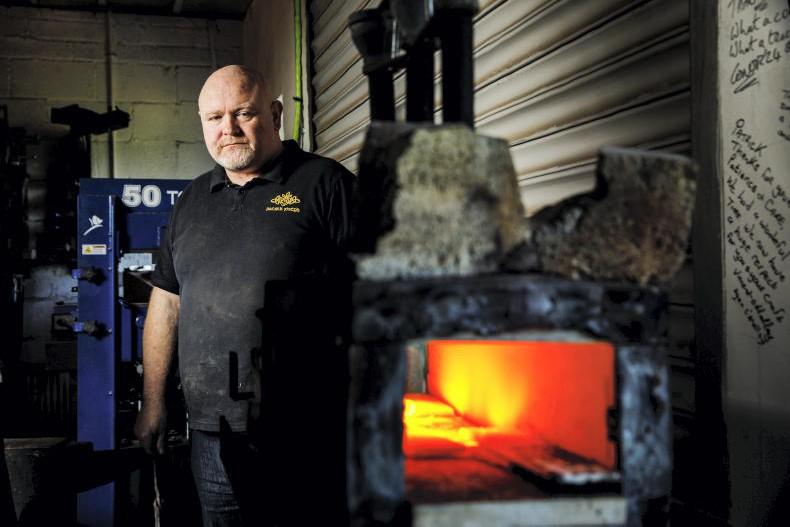

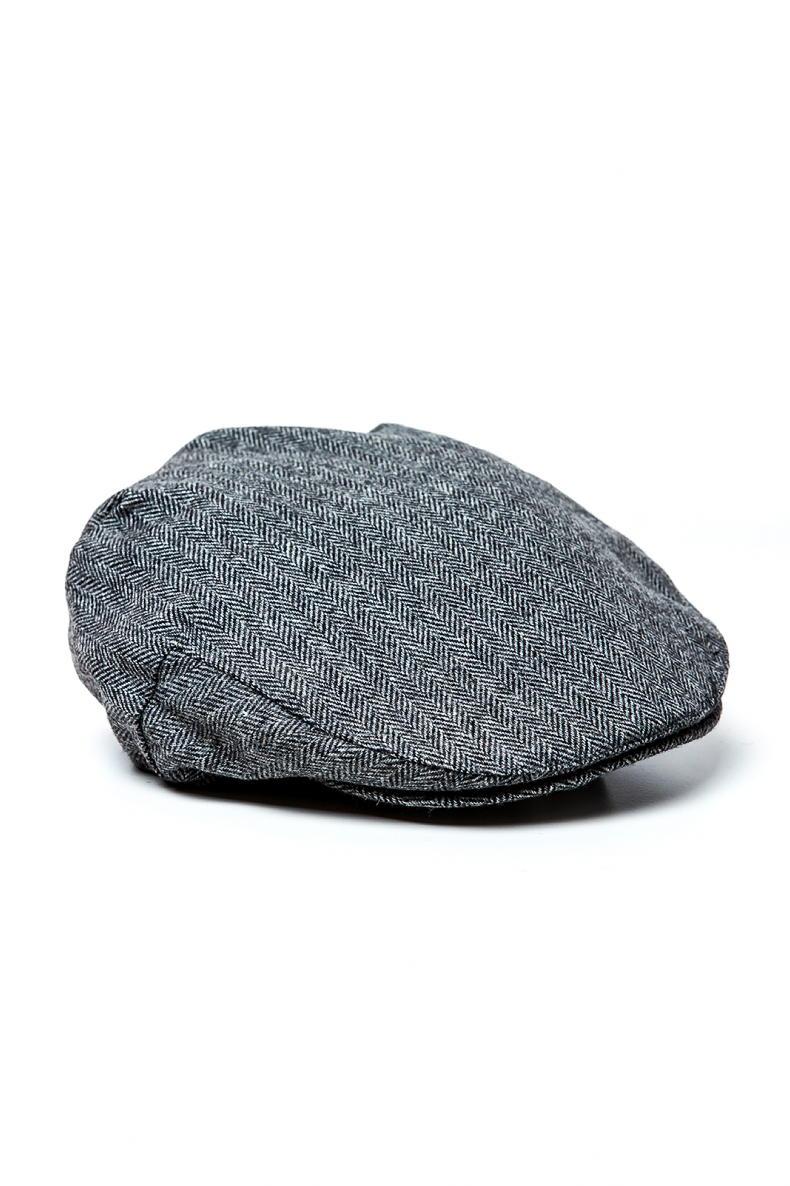
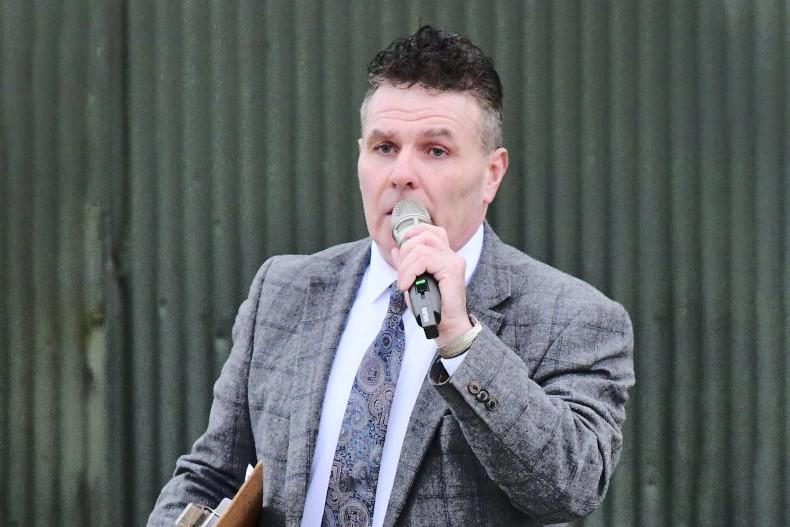
SHARING OPTIONS